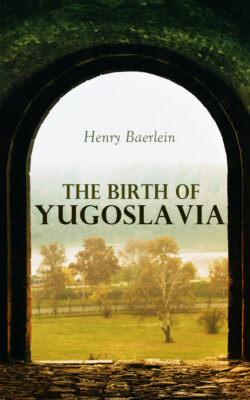Читать книгу The Birth of Yugoslavia - Henry Baerlein - Страница 20
На сайте Литреса книга снята с продажи.
THE GLORIOUS DUŠAN
ОглавлениеIt is facile for people of the twentieth century, and particularly so for non-Slavs, to say that this Serbian Empire of Dušan, Lord of the Serbs and Bulgars and Greeks, whom the Venetian Senate addressed as "Græcorum Imperator semper Augustus," resembled the earlier Bulgarian Empire of Simeon, who called himself Emperor of the Bulgars and the Vlachs, Despot of the Greeks, in that we would consider neither of them to be an empire; and that therefore, in celebrating their glories, with pointed reference to their Macedonian glories, the Serbs and the Bulgars are living in a fool's paradise. No doubt a great many persons dwelt in this Macedonia of Simeon and Dušan without being aware of the fact, for those who called themselves Bulgars or Serbs appear to have been chiefly the warriors, the nobles and the priests; a large part of the people were—as they are to-day—indifferent to such niceties. But there is latent in the Slav mind a longing for the absolute, which, except it be in some way corrected, inclines towards a moral anarchy, a social nihilism and indifference as to the destinies of the State. Looking merely at the consequence, it does not greatly seem to matter how this attitude is brought about. … One must admit that these two realms occupied in their world most prominent positions—positions to which they would not have attained if Simeon and Dušan had not been altogether exceptional men, for on their death there was not anybody great enough to keep the great men of the State together. We have spoken of Simeon's peaceful labours—we might cultivate more than we do the literature of that age if it were less dedicated to religious topics, which anyhow at that time gave little scope for originality—his consummate ability as a soldier and statesman is revealed in the existence of his empire; we find in the Code of Dušan, before such a thing flourished in England, the institution of trial by jury, while Hermann Wendel[17] has pointed out that the peasants were protected from rapacious landowners much more effectively than in the Germany of that age. … We need not try to establish whether the simple Macedonian desired to be under Simeon or Dušan; but even if these two monarchs had, each of them, as far as was then possible, complete control of the country, one would scarcely urge that after all these centuries this is any reason why Macedonia should fall to Bulgaria or to Serbia. We shall have to see whether by subsequent merits or activities either of them has acquired the right to absorb these outlying Slavs who, be it noted, if in our day they are questioned as to their nationality, will often reply—and even to an enthusiastic, armed person from one of the interested States—the worried Macedonian Slavs, of whom a quarter or maybe a third do really not know what they are, will reply that they are members of the Orthodox Church.
Dušan perceived that an alliance with Venice would serve his ends; he did not cease trying to persuade the Venetians that such an arrangement was also in their interest. After having sent an army to Croatia, in the hope of liberating that people from the Hungarians, he conquered Albania, and in 1340 asked to be admitted as a citizen of the Most Serene Republic. In 1345 he informed the Senate that it was his intention to be crowned in imperio Constantinopolitaneo, and at the same time suggested an alliance pro acquisitione imperii Constantinopolitani. But Venice, while reiterating her protestations of friendship, declined his offers; for she could not bring herself to join her fortunes to those of an ally who might become a rival.
